DNA Today: A Genetics Podcast
Discover New Advances in the world of genetics, from technology like CRISPR to rare diseases to new research. For over a decade, multi-award winning podcast ”DNA Today” has brought you the voices of leaders in genetics. Host Kira Dineen brings her genetics expertise to interview geneticists, genetic counselors, patient advocates, biotech leaders, researchers, and more.
***Best 2020, 2021, and 2022 Science and Medicine Podcast Award Winner***
Learn more (and stream all 380+ episodes) at DNAtoday.com. You can contact the show at info@DNAtoday.com.
This show is part of "Gene Pool Media: The Science Podcast Network" head to GenePoolMedia.com to explore all our science themed shows.
Episodes
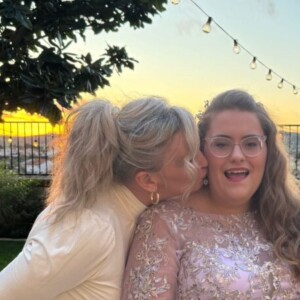
Friday Jun 14, 2024
Friday Jun 14, 2024
In this episode, we explore the rare genetic disorder Smith-Magenis Syndrome (SMS) with our guest, Scotti Taylor. Scotti shares her personal journey and insights about her oldest daughter, Drew, who was diagnosed with SMS. Join us as we learn about the challenges and triumphs faced by individuals with SMS and their families.
Scotti Taylor (she/her) is a fine artist based in Oceanside, California, and a mother to four teenagers and young adults. She divides her time between painting and advocacy work. Her art reflects her experiences as a trauma and substance abuse survivor, her roles as a wife and mother, and her responsibilities as a devoted caregiver to her adult daughter with disabilities. Taylor’s work also explores the challenges of navigating physical and social barriers in contemporary society, aiming to evoke empathy and compassion. Her primary artistic themes focus on raising awareness for perimenopausal women and illuminating the rare genetic disorder Smith-Magenis Syndrome, with which her oldest daughter was diagnosed at the age of 20.
Discussion Topics:
Introduction to Drew:
Scotti shares about her daughter Drew, her personality, and what brings her joy.
Understanding Smith-Magenis Syndrome (SMS):
Explanation of what SMS is and how it affects individuals.
Daily challenges faced by Drew and her family due to SMS.
Diagnostic Journey:
When Drew started showing symptoms and the beginning of their diagnostic odyssey.
Early involvement of healthcare providers in Drew’s diagnosis.
Physical Characteristics and Diagnosis:
Discussion on the subtle facial features of SMS and their presence in Drew.
The pivotal moment involving a fellow parent in a Special Needs Moms online group.
Scotti’s initial reaction to learning about SMS through online research.
Genetic Testing:
The process and challenges of getting genetic testing for Drew.
The insurance approval process for the genetic test.
Explanation of the inheritance patterns of SMS and if Scotti and Drew’s father were tested.
Symptoms and Precautions:
Managing decreased pain sensitivity and self-injurious behaviors in people with SMS.
Extra precautions parents and caregivers need to take to keep those with SMS safe.
Impact of sleep disturbances on Drew and the family.
Other hallmark features of SMS and their effects on Drew.
Family Dynamics:
Impact of raising a child with SMS on family dynamics and relationships with Drew’s siblings.
Awareness and Advocacy:
Importance of spreading awareness about Smith-Magenis Syndrome.
Scotti’s art and its role in her advocacy and personal coping.
Advice and Resources:
Advice for other parents or caregivers of individuals with SMS or similar conditions.
Valuable resources and support networks for families affected by SMS.
Closing Thoughts:
Scotti’s hopes for others to gain an understanding and appreciation of SMS through her experiences and advocacy.
Check out Scotti’s art here and her Instagram (@heyscottitaylor). Be sure to also check out PRISMS that Scotti recommends during the interview.
Stay tuned for the next new episode of DNA Today next Friday! New episodes are released every Friday. In the meantime, you can binge over 290 other episodes on Apple Podcasts, Spotify, streaming on the website, or any other podcast player by searching, “DNA Today”. Episodes since 2021 are also recorded with video which you can watch on our YouTube channel, this includes some episodes recorded at NBC Universal Stamford Studios.
DNA Today is hosted and produced by Kira Dineen. Our social media lead is Corinne Merlino. Our video lead is Amanda Andreoli. Our Outreach Intern is Sanya Tinaikar. Our Social Media Intern is Kajal Patel. And our logo Graphic Designer Ashlyn Enokian.
See what else we are up to on Instagram, X (Twitter), Threads, LinkedIn, Facebook, YouTube and our website, DNAToday.com. Questions/inquiries can be sent to info@DNAtoday.com.
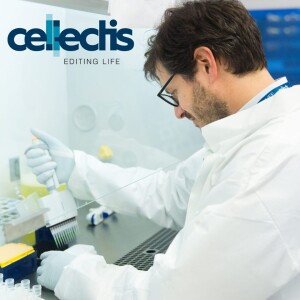
Friday Jun 07, 2024
Friday Jun 07, 2024
The real power of gene editing is being able to choose exactly where to edit a genetic disorder, as easily as correcting a tiny typo in a text.
With its 25 years of expertise, Cellectis was the first company to translate gene editing tools into potentially life-saving therapies. They invented the allogeneic approach (which is the transfer of cells from one individual to another). Cellectis’ technology, TALEN®, can make very precise edits, with limited to no off-target effects and we are learning more about it in this episode.
To do so, we are joined by Dr. Julien Valton, Vice President Gene Therapy at Cellectis.
On This Episode We Discuss:
Overview of Cellectis:
Celebrating 25 years of innovation in gene editing.
Overview of Cellectis’ journey and contributions to the field.
Understanding TALEN Technology:
Explanation of what TALEN stands for and how it works.
Comparison of TALEN with other gene editing technologies like CRISPR.
Advantages and disadvantages of using TALEN over CRISPR.
TALEN's intellectual property status and whether other companies are working on this technology.
Chimeric Antigen Receptor (CAR) T-cells:
Introduction to CAR T-cells and their role in gene editing with TALEN technology.
Recent Research and Innovations:
Discussion on the new paper co-authored by Dr. Valton on using TALEN technology to edit hematopoietic stem and progenitor cells.
Explanation of the “promoterless intronic gene editing approach” and how it differs from usual methods.
Reasons for choosing Mucopolysaccharidosis MPS type I for the study.
Insights into the decision to trigger gene expression only after cells have turned into the myeloid lineage.
Remarkable findings of “corrected cells” in the brains of mice and the implications for treating metabolic and neurological disorders.
Implications and Future Directions:
Potential therapeutic applications in the treatment of metabolic and neurological diseases.
Discussion on the recent partnership agreement with AstraZeneca.
Specific diseases targeted with TALEN in the near future and the goals of the collaboration with AstraZeneca.
Conclusion:
Final thoughts from Dr. Valton on the future of gene editing and Cellectis’ role in advancing this field.
Stay tuned for the next new episode of DNA Today next Friday! New episodes are released every Friday. In the meantime, you can binge over 290 other episodes on Apple Podcasts, Spotify, streaming on the website, or any other podcast player by searching, “DNA Today”. Episodes since 2021 are also recorded with video which you can watch on our YouTube channel, this includes some episodes recorded at NBC Universal Stamford Studios.
DNA Today is hosted and produced by Kira Dineen. Our social media lead is Corinne Merlino. Our video lead is Amanda Andreoli. Our Outreach Intern is Sanya Tinaikar. Our Social Media Intern is Kajal Patel. And our logo Graphic Designer Ashlyn Enokian.
See what else we are up to on Instagram, X (Twitter), Threads, LinkedIn, Facebook, YouTube and our website, DNAToday.com. Questions/inquiries can be sent to info@DNAtoday.com.
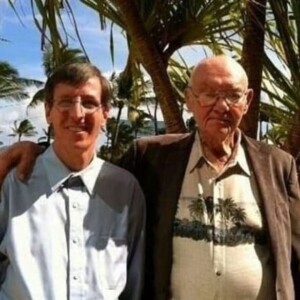
Friday May 31, 2024
Friday May 31, 2024
In this episode, we are joined by Dan Dry Dock Shockley, a retired Navy veteran and advocate living with a hereditary colon cancer syndrome. Dan’s journey from military service to becoming a passionate advocate for hereditary cancer awareness is both inspiring and educational. Tune in as we delve into his personal experiences, the importance of early detection, and his ongoing mission to educate others.
Discussion Topics
Dan's Diagnosis and Perspective: Diagnosed at age 51 with no symptoms and no family history of colon cancer. He shares how this diagnosis shaped his perspective on health and life.
Genetic Testing Journey: Details about who ordered Dan's genetic testing and the education and counseling he received and the information about his specific genetic variant.
Understanding Attenuated FAP: Explanation of attenuated familial adenomatous polyposis (AFAP) and its impact on Dan’s life.
Advocacy and Inspiration:What inspired Dan to become an advocate for hereditary colon cancer syndrome and pancreatic cancer awareness.
Importance of Early Detection: The crucial role of colonoscopies in early cancer detection and treatment, especially in the context of hereditary cancer syndromes like AFAP.
Meeting Dr. Henry Lynch: Dan’s experience meeting Dr. Henry Lynch, a pioneer in cancer genetics and the significance of Dr. Lynch's groundbreaking work.
Continuing Dr. Lynch's Legacy: Dan's motivation to continue Dr. Henry T. Lynch's legacy of educating medical students and professionals about AFAP.
Navigating with a Positive Attitude: How Dan’s mantra, "Always Forge Ahead with a Purpose," and its significance in guiding him.
Myth-busting Hereditary Cancer Syndromes: Common misconceptions about hereditary cancer syndromes and how Dan addresses them.
Advice for Others: Dan’s advice for individuals diagnosed with hereditary cancer syndromes or undergoing cancer treatment.
Stay tuned for the next new episode of DNA Today next Friday! New episodes are released every Friday. In the meantime, you can binge over 290 other episodes on Apple Podcasts, Spotify, streaming on the website, or any other podcast player by searching, “DNA Today”. Episodes since 2021 are also recorded with video which you can watch on our YouTube channel, this includes some episodes recorded at NBC Universal Stamford Studios.
DNA Today is hosted and produced by Kira Dineen. Our social media lead is Corinne Merlino. Our video lead is Amanda Andreoli. Our Outreach Intern is Sanya Tinaikar. Our Social Media Intern is Kajal Patel. And our logo Graphic Designer Ashlyn Enokian.
See what else we are up to on Instagram, X (Twitter), Threads, LinkedIn, Facebook, YouTube and our website, DNAToday.com. Questions/inquiries can be sent to info@DNAtoday.com.
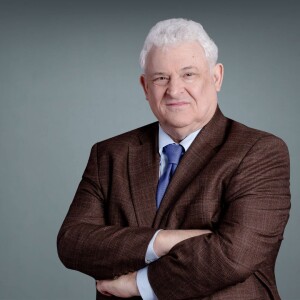
Friday May 24, 2024
Friday May 24, 2024
To discuss ethics in genetics, we are honored to host Dr. Arthur Caplan (he/him), a renowned bioethicist and a pivotal figure in the field of medical ethics. He is currently the Drs. William F and Virginia Connolly Mitty Professor and founding head of the Division of Medical Ethics at NYU School of Medicine in New York City.
Topics Covered:
Evolution of Bioethics in Genetics:
Insights into how the landscape of bioethics within genetics has evolved over the years.
CRISPR Technology:
Ethical concerns surrounding the use of CRISPR technology for editing the human germ line.
Discussion of Dr. Caplan's influential 2015 paper on CRISPR, cited over 200 times.
Examination of international treaties and policies governing CRISPR use, and their effectiveness, especially in the context of the controversial case of the Chinese scientist who edited embryos.
Ethical Concerns with CRISPR:
Issues of accessibility, cost, and informed consent for CRISPR-based therapies.
Risks associated with the misuse of CRISPR for bioterrorism or biowarfare, and mitigation strategies through regulation and oversight.
AI in Genetics:
Potential impact of rapidly advancing AI technology in genetics.
Concerns about privacy and confidentiality related to AI applications in genetic data.
IVF and Legal Rulings:
Discussion of the February 2024 Alabama Supreme Court ruling that embryos created through IVF should be considered children.
Implications for IVF clinics in Alabama and potential repercussions if other states follow suit.
Impact on individuals using IVF with preimplantation genetic screening (PGS) to prevent genetic conditions.
Dr. Caplan was the Sidney D. Caplan Professor of Bioethics at the University of Pennsylvania Perelman School of Medicine in Philadelphia, where he created the Center for Bioethics and the Department of Medical Ethics. Caplan has also taught at the University of Minnesota, where he founded the Center for Biomedical Ethics, the University of Pittsburgh, and Columbia University. He received his PhD from Columbia University.
Dr. Caplan is the author or editor of thirty-five books and over 860 papers in peer reviewed journals. His most recent books are Vaccination Ethics and Policy, with Jason Schwartz and, Getting to Good: Research Integrity in Biomedicine with Barbara Redman.
He has served on a number of national and international committees including as the chair of the National Cancer Institute Biobanking Ethics Working Group, chair of the Advisory Committee to the United Nations on Human Cloning; chair of the Advisory Committee to the Department of Health and Human Services on Blood Safety and Availability. He has also served on the Presidential Advisory Committee on Gulf War Illnesses, the special advisory committee to the International Olympic Committee on genetics and gene therapy, the Special Advisory Panel to the National Institutes of Mental Health on Human Experimentation on Vulnerable Subjects, the Wellcome Trust Advisory Panel on Research in Humanitarian Crises, and the co-director of the Joint Council of Europe/United Nations Study on Trafficking in Organs and Body Parts.
Caplan has served since 2015 as the chairperson of the Compassionate Use Advisory Committee (CompAC), an independent group of internationally recognized medical experts, bioethicists and patient representatives which advises Johnson & Johnson’s Janssen Pharmaceuticals about requests for compassionate use of some of its investigational medicines.
Dr. Caplan is a regular commentator on bioethics and health care issues for WebMD/Medscape, WGBH radio in Boston, WOR radio in New York City and KNX-CBS radio, Los Angeles. He appears frequently as a guest and commentator on various other national and international media outlets.
Dr. Caplan is the recipient of many awards and honors including the McGovern Medal of the American Medical Writers Association and the Franklin Award from the City of Philadelphia. He was a USA Today 2001 “Person of the Year and was described as one of the ten most influential people in science by Discover magazine in 2008.
He has also been honored as one of the fifty most influential people in American health care by Modern Health Care magazine, one of the ten most influential people in America in biotechnology by the National Journal, one of the ten most influential people in the ethics of biotechnology by the editors of Nature Biotechnology, and, one of the 100 most influential people in biotechnology by Scientific American magazine.
During the Covid-19 pandemic, he co-directed an advisory group on sports and recreation for the US Conference of Mayors, created a national working group on coronavirus vaccine challenge studies, developed an ethical framework for distributing drugs and vaccines for J&J, helped develop rationing policies for NYU LMC and many other health systems, was a member of the WHO advisory committee on Covid, ethics and experimental drugs/vaccines, and helped set policy for WIRB/WCG for research studies He was an advisor to Moderna and Accenture. And he continues to serve on the NCAA Sports and Covid committee.
He received the Patricia Price Browne Prize in Biomedical Ethics for 2011. In 2014 he was selected to receive the Public Service Award from the National Science Foundation/National Science Board, which honors individuals and groups that have made substantial contributions to increasing public understanding of science and engineering in the United States. In 2016 the National Organization for Rare Disorders (NORD) honored him with their Rare Impact Award and hFood and Drug Law Institute’s Distinguished Service Leadership Award. In 2019 he was honored by the Food and Drug Administration’s, Reagan/Udall Foundation with its Innovation Award.NYU Rory Meyers College of Nursing Humanitarian Award.He holds seven honorary degrees from colleges and medical schools.
Check out these articles related (or mentioned) during the episode.
DNA Today Episode #284 IVF Implications of Alabama's Frozen Embryo Ruling with Laura Hercher
DNA Today Episodes #288 and #289 CRISPR Cured Victoria Gray’s Sickle Cell
No time to waste—the ethical challenges created by CRISPR
Standing on the Shoulders of Giant Artificial Intelligence Bots: Artificial Intelligence Can and Therefore Must Now Elevate Equity in Health Professional Education
Dr. Athur Caplan's Faculty Listing at NYU
Genetic Counseling Ethical Challenges and Consequences Book Co-Authored by Dr. Caplin
Hospital At Center of Alabama Embryo Ruling Is Ending IVF Services (NY Times Article)
Dr. Caplan was also generous enough to provide his email address (Arthur.Caplan@nyulangone.org) so you can reach out to him directly for any questions or comments.
Stay tuned for the next new episode of DNA Today next Friday! New episodes are released every Friday. In the meantime, you can binge over 290 other episodes on Apple Podcasts, Spotify, streaming on the website, or any other podcast player by searching, “DNA Today”. Episodes since 2021 are also recorded with video which you can watch on our YouTube channel, this includes some episodes recorded at NBC Universal Stamford Studios.
DNA Today is hosted and produced by Kira Dineen. Our social media lead is Corinne Merlino. Our video lead is Amanda Andreoli. Our Outreach Intern is Sanya Tinaikar. Our Social Media Intern is Kajal Patel. And our logo Graphic Designer Ashlyn Enokian.
See what else we are up to on Instagram, X (Twitter), Threads, LinkedIn, Facebook, YouTube and our website, DNAToday.com. Questions/inquiries can be sent to info@DNAtoday.com.
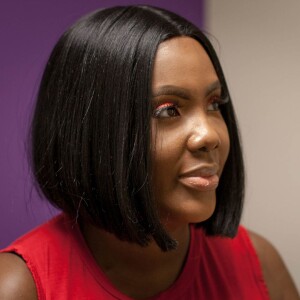
Friday May 17, 2024
Friday May 17, 2024
Victoria is a patient advocate and international speaker from Mississippi. She is also a wife and mother of four children. Since being treated with CRISPR she has been featured in nearly every major publication including PBS, NPR, Forbes, Good Morning America, New York Times, and more.
In the first part of our conversation she shared about her experiences prior to being cured including her sickle cell pain crisis and the medical racism she faced. If you haven’t heard this episode yet, we very much encourage you to go back to Episode #288 and listen, this is one of the most raw interviews we have had on the show over the last decade.
In the second part of our interview in this episode, Victoria talks about inspiring others to pursue the CRISPR treatment and dives into her own CRISPR experience including the decision making process to go for it, the treatment regime itself, and her quality of life today after being cured.
Victoria is a patient advocate and international speaker from Mississippi. She is also a wife and mother of four children. Since being treated with CRISPR she has been featured in nearly every major publication including PBS, NPR, Forbes, New York Times, and more.
Victoria Gray, the first person in the world to be cured of a genetic condition using CRISPR, shares her experience with sickle cell disease and the challenges she faced in receiving proper care. She describes the frequent pain crises she experienced, the lack of understanding and empathy from healthcare providers, and the stigma associated with sickle cell patients. Victoria highlights the disparities in research funding and support for sickle cell compared to other genetic conditions. She also discusses the importance of mental health care and the need for better education and communication from healthcare providers. Victoria Gray shares her experience as the first person to be treated with CRISPR for sickle cell disease. She discusses the mistreatment and lack of options she faced as a patient, highlighting the ongoing issue of healthcare disparities. Victoria also talks about the impact of her story on others, including a fan who was inspired to pursue CRISPR treatment. She emphasizes the importance of mental health and the role of faith in her journey. The conversation explores the CRISPR procedure, the timeline of the treatment, and the transformation it has brought to Victoria's life.
During the interview we mentioned a couple other episodes of DNA Today that also explore sickle cell disease.
#197 CRISPR Quality Control with Kiana Aran
#201 Sickle Cell Disease with Lifting the Veil
#214 2022 Genetics Wrapped with Eric Green
#251 Diversifying Genetic Research with 23andMe
#266 Genetics Wrapped 2023
You can also binge over 280 other episodes on Apple Podcasts, Spotify, streaming on the website, or any other podcast player by searching, “DNA Today”. Episodes since 2021 are also recorded with video which you can watch on our YouTube channel, this includes some episodes recorded at NBC Universal Stamford Studios.
DNA Today is hosted and produced by Kira Dineen. Our social media lead is Corinne Merlino. Our video lead is Amanda Andreoli. Our Outreach Intern is Sanya Tinaikar. Our Social Media Intern is Kajal Patel. And our logo Graphic Designer Ashlyn Enokian.
See what else we are up to on Instagram, X (Twitter), Threads, LinkedIn, Facebook, YouTube and our website, DNAToday.com. Questions/inquiries can be sent to info@DNAtoday.com.
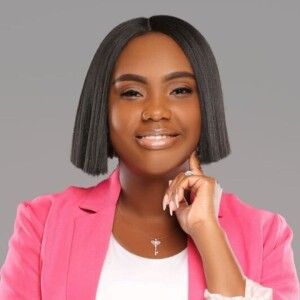
Friday May 10, 2024
Friday May 10, 2024
It has happened. CRISPR has been successfully used to treat sickle cell, we’d even venture to use the term cure. And today we are talking with the first person in the world who was cured from a genetic condition using CRISPR, Victoria Gray!
Victoria is a patient advocate and international speaker from Mississippi. She is also a wife and mother of four children. Since being treated with CRISPR she has been featured in nearly every major publication including PBS, NPR, Forbes, New York Times, and more.
Victoria Gray, the first person in the world to be cured of a genetic condition using CRISPR, shares her experience with sickle cell disease and the challenges she faced in receiving proper care. She describes the frequent pain crises she experienced, the lack of understanding and empathy from healthcare providers, and the stigma associated with sickle cell patients. Victoria highlights the disparities in research funding and support for sickle cell compared to other genetic conditions. She also discusses the importance of mental health care and the need for better education and communication from healthcare providers. Victoria Gray shares her experience as the first person to be treated with CRISPR for sickle cell disease. She discusses the mistreatment and lack of options she faced as a patient, highlighting the ongoing issue of healthcare disparities. Victoria also talks about the impact of her story on others, including a fan who was inspired to pursue CRISPR treatment. She emphasizes the importance of mental health and the role of faith in her journey. The conversation explores the CRISPR procedure, the timeline of the treatment, and the transformation it has brought to Victoria's life.
Key Takeaways
Sickle cell disease causes frequent and severe pain crises, which can be debilitating and unpredictable.
Healthcare providers often lack understanding and empathy towards sickle cell patients, leading to mistreatment and stigma.
There is a significant disparity in research funding and support for sickle cell compared to other genetic conditions.
Mental health care is crucial for individuals with sickle cell disease, but it is often overlooked.
Better education and communication from healthcare providers are needed to improve the care and support for sickle cell patients. Healthcare disparities and mistreatment of patients with genetic conditions are ongoing issues that need to be addressed.
The impact of Victoria Gray's story extends beyond her own experience and has inspired others to pursue CRISPR treatment.
Mental health and faith played a significant role in Victoria's journey.
The CRISPR procedure involved bone marrow collection, editing the cells with CRISPR, and reintroducing them into Victoria's body.
The treatment has transformed Victoria's life, allowing her to regain independence and participate in activities she couldn't before.
During the interview we mentioned a couple other episodes of DNA Today that also explore sickle cell disease.
#197 CRISPR Quality Control with Kiana Aran
#201 Sickle Cell Disease with Lifting the Veil
#214 2022 Genetics Wrapped with Eric Green
#251 Diversifying Genetic Research with 23andMe
#266 Genetics Wrapped 2023
Hear the second half of Victoria’s interview on the next episode (Episode #289) of DNA Today releasing on Friday May 17th. But you don’t have to wait, you can stream the entire conversation (part 1 and 2) in this YouTube video.
You can also binge over 280 other episodes on Apple Podcasts, Spotify, streaming on the website, or any other podcast player by searching, “DNA Today”. Episodes since 2021 are also recorded with video which you can watch on our YouTube channel, this includes some episodes recorded at NBC Universal Stamford Studios.
DNA Today is hosted and produced by Kira Dineen. Our social media lead is Corinne Merlino. Our video lead is Amanda Andreoli. Our Outreach Intern is Sanya Tinaikar. Our Social Media Intern is Kajal Patel. And our logo Graphic Designer Ashlyn Enokian.
See what else we are up to on Instagram, X (Twitter), Threads, LinkedIn, Facebook, YouTube and our website, DNAToday.com. Questions/inquiries can be sent to info@DNAtoday.com.
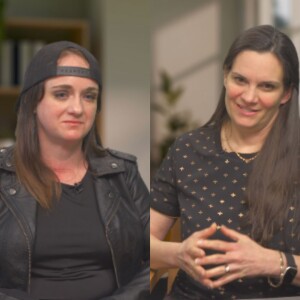
Friday May 03, 2024
Friday May 03, 2024
We dive into the journey of a family who unexpectedly discovered a genetic condition and the pivotal role that research at the National Institutes of Health (NIH) played in their understanding and treatment. Joining us are Jess, a patient with a secondary genetic finding, and her genetic counselor, Julie Sapp, from the National Human Genome Research Institute.
Secondary genetic findings, often termed as incidental or unexpected results, can have profound implications for individuals and their families. Today, we explore Jess's experience with receiving such a result and the collaborative efforts between patients, genetic counselors, and researchers in navigating this journey.
Meet Our Guests:
Jess: A patient who received a secondary genetic finding and embarked on a journey of understanding and treatment.
Julie Sapp: A genetic counselor at the National Human Genome Research Institute, leading research efforts in the Genomic Services Research Program (GSRP), focusing on individuals with secondary findings.
Julie Chevalier Sapp, PhD, ScM, CGC is a genetic counselor at the Center for Precision Health Research at the National Human Genome Research Institute where she studies social and behavioral questions related to the practice of clinical genomics and genetic counseling. Her research interests include how people and systems make use of genomic data, the implementation of genomic screening, and the clinical utility of genomic techniques. Julie received her genetic counseling degree from the Johns Hopkins/NHGRI genetic counseling training program in 2005 and her PhD in Translational Health Science from the George Washington University in 2024.
Interview Highlights:
Understanding Secondary Findings:
Julie provides insights into what constitutes a secondary finding in genetic testing and the importance of comprehending associated health risks and outcomes.
Patient Perspective:
Jess shares her personal experience of receiving a secondary finding and discusses her journey to the Genomic Service Research Program (GSRP) at the NIH.
Role of Genomic Testing in Diagnosis:
Julie elaborates on how molecular diagnosis obtained through genomic testing contributed to Jess's clinical diagnosis and subsequent healthcare management.
Importance of Interventions:
Julie emphasizes the significance of interventions and preventive measures in managing genetic conditions like Familial Hypercholesterolemia (FH).
Challenges and Barriers:
Both Jess and Julie shed light on the challenges patients face in accessing appropriate care and how genetic counselors can support them in navigating these barriers.
Research Insights and Future Directions:
Julie discusses the insights gained from Jess's case and the broader implications for research and clinical practice in the realm of genomic medicine.
Jess's journey exemplifies the transformative potential of collaborative research efforts in elucidating the complexities of genetic conditions and guiding personalized healthcare interventions. As we continue to advance in genomic research and testing, the experiences shared in this episode underscore the importance of patient-centered care and the invaluable contributions of genetic counselors and researchers alike.
Be sure to check out the National Human Genome Research Institute including their Genomic Services Research Program (GSRP).
Stay tuned for the next new episode of DNA Today next Friday since new episodes are released every Friday! In the meantime, you can binge over 285 other episodes on Apple Podcasts, Spotify, streaming on the website, or any other podcast player by searching, “DNA Today”. Episodes since 2021 are also recorded with video which you can watch on our YouTube channel.
DNA Today is hosted and produced by Kira Dineen. Our social media lead is Corinne Merlino. Our video lead is Amanda Andreoli. Our Outreach Intern is Sanya Tinaikar. Our Social Media Intern is Kajal Patel. And our Graphic Designer Ashlyn Enokian.
See what else we are up to on Twitter, Instagram, Facebook, YouTube and our website, DNAToday.com. Questions/inquiries can be sent to info@DNAtoday.com.
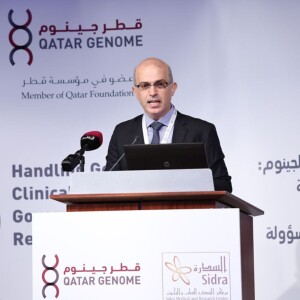
Friday Apr 26, 2024
Friday Apr 26, 2024
We have an international perspective in this episode who is a leader in genetics in Qatar. We previously talked to the first certified genetic counselor in Qatar, Shenela Lakhani, in Episode #109. If you haven’t yet we encourage you to check that interview out.
In this episode, We learn about the Qatar Genome Program (QGP), which is part of the Qatar Foundation, from the Director himself, Dr. Said Ismail. Dr. Ismail was pivotal to the establishment of the Qatar Genome Program -- a groundbreaking genome sequencing initiative that started in 2015 and is the largest project of its kind in the Middle East. QGP was the first whole-genome sequencing operation in the region to study Qatari and Arab genomes.
Dr. Said Ismail expertise and research lie in the fields of molecular biology and genetics, with a focus on cancer genetics, precision medicine, and the screening and characterization of disease-related mutations in the Arab population. Dr. Ismail has work experience across various fields, including research, education, and consultancy. He served as a consultant to several regional and international pharma and biotech companies. He headed the Jordan University Hospital molecular diagnostics reference laboratory, and was a board member of the local advisory board of the International Consortium for the American Society for Clinical Pathology International (ASCPI). He is the first president and co-founder of the International Society on Aptamers and is also an editorial board member of multiple international journals.
Dr. Ismail has a special interest in promoting research among young students. He launched one of the largest efforts to enhance the Arabic medical content on the internet, The “Bel-Arabi” or “In-Arabic” initiative: "بالعربي". He is also a board member of the Phi Science Institute aiming to encourage young students to pursue careers in research.
Dr. Ismail won the Said Foundation prize for young Arab researchers in the UK, and the Shoman award for Arab researchers in biomedical sciences in 2013. Dr Ismail holds a Ph.D. from the University of Oxford.
Key Insights from the Interview:
Inspiration behind QGP: Dr. Ismail shares his motivations for spearheading such a groundbreaking initiative, emphasizing the importance of advancing genomic research to enhance healthcare outcomes and address the unique genetic characteristics of the Arab population.
Significance of Diversity: We explore the importance of accessing diverse genomic information, particularly concerning the Arab population, in advancing precision medicine. Dr. Ismail highlights the role of QGP in uncovering genetic variations specific to the Qatari population and their implications for disease susceptibility and treatment outcomes.
Collaborative Efforts: Dr. Ismail discusses QGP's collaborations with other institutions and researchers to advance genomic research globally. Through partnerships and knowledge exchange, QGP aims to contribute to the broader understanding of genomics and precision medicine.
Challenges and Future Prospects: We delve into the challenges encountered in implementing precision medicine approaches and the future prospects of genomic research in Qatar and the wider region. Dr. Ismail provides insights into the evolving landscape of precision healthcare and the potential challenges that lie ahead.
Relevant Links:
Qatar Genome Program: https://www.qatargenome.org.qa/
News Story on QGP: https://www.eurekalert.org/news-releases/907772
Perception of consanguineous marriage among the qatari population: https://www.ncbi.nlm.nih.gov/pmc/articles/PMC10436573/
Qatar completes genome sequencing of 30,000 citizens: https://www.gulf-times.com/article/668469/qatar/qatar-completes-genome-sequencing-of-30000-citizens
Mappin The Arab Genome: https://www.nature.com/articles/s41588-022-01239-0
GWAS paper: https://www.nature.com/articles/s41467-021-21381-3
PGx paper: https://www.nature.com/articles/s41525-022-00281-5
Familial Cancer paper: https://www.thelancet.com/journals/lanonc/article/PIIS1470-2045(21)00752-X/abstract
ACMG paper: https://onlinelibrary.wiley.com/doi/pdf/10.1002/humu.24278
Population Structure paper: https://www.nature.com/articles/s41467-021-25287-y
Stay tuned for the next new episode of DNA Today next Friday! New episodes are released every Friday. In the meantime, you can binge over 280 other episodes on Apple Podcasts, Spotify, streaming on the website, or any other podcast player by searching, “DNA Today”. Episodes since 2021 are also recorded with video which you can watch on our YouTube channel, this includes some episodes recorded at NBC Universal Stamford Studios.
DNA Today is hosted and produced by Kira Dineen. Our social media lead is Corinne Merlino. Our video lead is Amanda Andreoli. Our Outreach Intern is Sanya Tinaikar. Our Social Media Intern is Kajal Patel. And our logo Graphic Designer Ashlyn Enokian.
See what else we are up to on Instagram, X (Twitter), Threads, LinkedIn, Facebook, YouTube and our website, DNAToday.com. Questions/inquiries can be sent to info@DNAtoday.com.
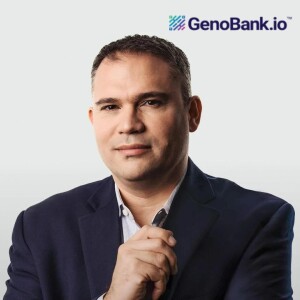
Friday Apr 19, 2024
Friday Apr 19, 2024
In our most streamed episode of 2023, we delved into the fascinating world of Artificial Intelligence (AI) and its impact on genetics with Daniel Uribe, the founder and CEO of GenoBank.io. Now, Daniel returns to the show to provide us with insights into the latest advancements in AI technology and its applications in genetics.
In Episode #231, Daniel Uribe and our host Kira Dineen discussed the transformative potential of AI in genetics, focusing on its role in variant curation and diagnostic processes. Since then, AI has continued to evolve rapidly, revolutionizing the field of genetics and offering new possibilities for understanding health and DNA.
Danie Uribe, MBA, founder and CEO of GenoBank.io, is at the forefront of integrating AI with genomics to empower individuals and families in understanding their health and DNA. With a deep background in data science, artificial intelligence, and bioinformatics, Danie’s leadership has steered GenoBank.io to develop groundbreaking protocols that utilize BioNFTs for secure genomic data governance. His work champions the cause of data privacy and sovereignty in personal genomics, leveraging AI to demystify complex genetic information for personal health empowerment. An alumnus of IPADE Business School, Danie holds additional certifications in Ethereum Solidity Dapp, eQTL Functional Genetics, and RNA-seq Workshop. A pioneer in the DeSci movement, he is dedicated to making GenoBank.io a beacon for individuals seeking to navigate their health journey with confidence, supported by accessible and secure genomic insights.
Interview Highlights:
Advancements in AI Technology:
Daniel provides an overview of the remarkable progress AI has made since our last conversation on Episode #231 in early 2023, highlighting its growing influence and expanding applications in genetics. From variant curation to diagnostic workflows, AI is transforming the way we understand and interpret genomic data.
Current Uses of AI in Genetics:
Daniel explores the diverse ways in which AI is already being utilized in genetics, from prioritizing workflow for variant curation to filtering through large volumes of genomic data. He shares real-world examples of AI-driven solutions that have enhanced efficiency and accuracy in genomic analysis.
Impact on Genetic Jobs:We discuss the potential implications of AI on genetic jobs and whether AI will replace certain roles in the field. Daniel offers insights into how AI can augment the capabilities of genetic counselors and other experts, emphasizing the importance of embracing AI as a valuable tool rather than a replacement.
Enhancing Variant Curation with AI:
Daniel explains the role of AI in prioritizing variants for further investigation in the curation workflow and how it accelerates the diagnostic odyssey, particularly for individuals with rare diseases. He addresses concerns about costs and disparities in variant curation and discusses the potential of AI to close these gaps.
Addressing Challenges and Security Concerns:
We delve into the challenges genetic counselors face in adopting AI tools and discuss strategies for overcoming these obstacles. Daniel also highlights the importance of data security and the need for robust measures to protect individuals' data while utilizing AI tools in genetic analysis.
Regulatory Landscape and Future Outlook:
Daniel provides updates on regulations and policies affecting the use of AI in genetics, particularly in the US. He shares insights into the integration of AI as a co-pilot in the profession of genetic counseling and discusses the future trajectory of AI-driven advancements in genetics.
As we navigate the dynamic landscape of AI and genetics, Daniel's expertise offers invaluable insights into the transformative potential of this technology. From improving diagnostic accuracy to addressing disparities in variant curation, AI holds immense promise for revolutionizing the field of genetics and enhancing patient care. Be sure to check out GenoBank.io.
Stay tuned for the next new episode of DNA Today next Friday! New episodes are released every Friday. In the meantime, you can binge over 285 other episodes on Apple Podcasts, Spotify, streaming on the website, or any other podcast player by searching, “DNA Today”. Episodes since 2021 are also recorded with video which you can watch on our YouTube channel, this includes some episodes recorded at NBC Universal Stamford Studios.
DNA Today is hosted and produced by Kira Dineen. Our social media lead is Corinne Merlino. Our video lead is Amanda Andreoli. Our Outreach Intern is Sanya Tinaikar. Our Social Media Intern is Kajal Patel. And our logo Graphic Designer Ashlyn Enokian.
See what else we are up to on Instagram, X (Twitter), Threads, LinkedIn, Facebook, YouTube and our website, DNAToday.com. Questions/inquiries can be sent to info@DNAtoday.com.
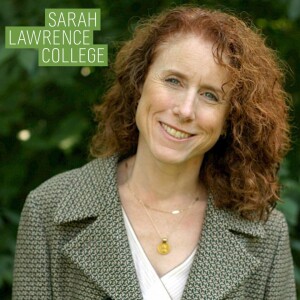
Friday Apr 12, 2024
Friday Apr 12, 2024
Trigger warning: In this episode sensitive topics are discussed including, but not limited to, miscarriage, sexual abuse, manslaughter, and child abuse.
On February 16th, 2024 the Alabama Supreme Court brought fertility care in that state to a screeching halt—and started a national conversation—by declaring that frozen embryos were people in the eyes of the law.
This is the first line of Laura Hercher’s Scientific American article, “How Arguments that Embryos Are People Pose a Threat to IVF''.
And we are lucky enough to have Laura joining us to discuss this!
For those that somehow don’t know Laura Hercher, you haven’t listened to enough episodes of DNA Today she has become our correspondent when major legislation happens that affects reproductive medicine, check those episodes out below.
#157 NSGC 2021 Recap (Texas Abortion Ban)
#191 Overturning Roe v. Wade with Laura Hercher
Laura Hercher (she/her) is a genetic counselor and the Director of Student Research at Sarah Lawrence College’s Joan H. Marks Graduate Program in Human Genetics, where her research focuses on ethical, legal and social issues in genomic medicine. Her work as a commentator and journalist has been published in a wide variety of media outlets, including Scientific American, the MIT Technology Review, the Nation Magazine and the New York Times. At present, she is working on a book examining the societal implications of reproductive genomic medicine in the United States, tentatively entitled “The Ghettoization of Genetic Disease.”
On This Episode We Discuss:
Overview of the Alabama Supreme Court case and its ruling on the legal status of frozen embryos
Definition of personhood and its implications for IVF and Republican politicians
Implications of the ruling for couples seeking fertility treatment involving frozen embryos
Impact of the ruling on the use of IVF for preventing hereditary conditions
Considerations regarding legal liabilities and responsibilities for abandoned embryos
Historical exemptions of IVF from abortion restrictions and its future under personhood laws
Tensions between embryo recognition as individuals and practical IVF procedures
Potential changes in availability and affordability of IVF due to legal implications
Precedents from other countries and legal systems regarding IVF and embryo personhood
Role of the U.S. Supreme Court in adjudicating similar reproductive rights cases
Teaser for Laura Hercher’s upcoming book on the societal implications of reproductive genomic medicine
If you listened until the end of the episode, you heard Laura Hercher’s breaking news. No spoilers, but now you have to listen to our episode about how accurate the genetics in the 1997 movie Gattaca is today, that’s Episode #110.
Stay tuned for the next new episode of DNA Today next Friday! New episodes are released every Friday. In the meantime, you can binge over 280 other episodes on Apple Podcasts, Spotify, streaming on the website, or any other podcast player by searching, “DNA Today”. Episodes since 2021 are also recorded with video which you can watch on our YouTube channel, this includes some episodes recorded at NBC Universal Stamford Studios.
DNA Today is hosted and produced by Kira Dineen. Our social media lead is Corinne Merlino. Our video lead is Amanda Andreoli. Our Outreach Intern is Sanya Tinaikar. Our Social Media Intern is Kajal Patel. And our logo Graphic Designer Ashlyn Enokian.
See what else we are up to on Instagram, X (Twitter), Threads, LinkedIn, Facebook, YouTube and our website, DNAToday.com. Questions/inquiries can be sent to info@DNAtoday.com.








